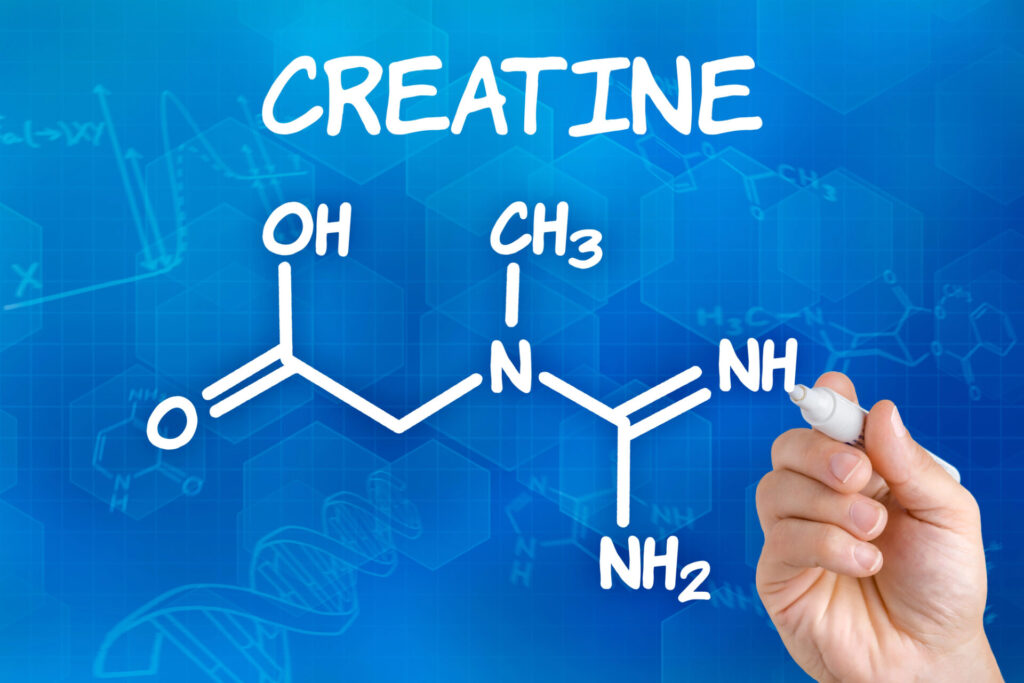Creatine’s role in fitness and muscle health is well-supported, and studies show numerous other health benefits, including improved cognition. Creatine is a compound from amino acids that supplies energy to the brain, muscles, and other organs. Dysfunction in the creatine system may contribute to Alzheimer’s disease (AD) development. Preclinical mouse studies show that creatine monohydrate (CrM) improves cognition and AD biomarkers. The first human study in AD shows promise, although larger studies will help confirm the benefits.
The brain’s creatine system is important for energy metabolism. Creatine shuttles high-energy phosphates from mitochondria to the cytosol, where it forms phosphocreatine (PCr) to help regenerate ATP. Supplementing with CrM increases creatine and PCr in the brain, potentially offering a cost-effective way to support brain mitochondrial function and cognition in AD.
The Study
The Creatine to Augment Bioenergetics in Alzheimer’s (CABA) trial is a single-arm pilot trial published in Alzheimer’s & Dementia Translational Research & Clinical Interventions. Twenty patients meeting the McKhann criteria for dementia due to AD were given 20 grams CrM daily, split into two 10g doses for 8 weeks. All patients took AD-related medications and did not have other neurodegenerative diseases.
Several metrics were assessed:
- Serum creatine levels were used to monitor regimen compliance and were measured at baseline, 4 weeks, and 8 weeks. Serum creatine was significantly elevated at 4 and 8 weeks.
- Brain creatine was assessed using H magnetic resonance spectroscopic imaging (MRSI) scans at baseline and at 8 weeks. Brain creatine significantly increased by 11% over the 8-week study. Increased brain creatine is correlated with improved cognitive ability.
- Plasma phosphorylated tau-217 (p-tau217), a marker of brain amyloid pathology, was assessed at baseline and at 8 weeks. Eighteen patients with p-tau concentrations >/=0.4 pg/mL were considered positive, indicating AD neuropathology. (Levels at 8 weeks were not included in the publication for comparison.)
- Cognition was assessed using a mini-mental status exam and the National Institutes of Health (NIH) Toolbox Cognition Battery at baseline and at 8 weeks. CrM supplementation was associated with improved total cognition, fluid cognition, list sorting working memory, and oral reading recognition.
Supplementation with CrM improved memory and executive function, which are the most affected domains in AD. The change in brain creatine was correlated with a change in the oral reading recognition and with crystallized cognition. Oral reading recognition assesses the ability to properly read and pronounce a visually presented word. Crystalized cognition refers to the retrieval and application of existing knowledge, whereas fluid cognition relies on processing new information to solve novel problems.
Supplementation was safe and well-tolerated with few mild adverse effects.
Conclusions
Previous studies have shown that creatine supplementation increases brain creatine and supports cognitive health in healthy individuals. CrM supplementation also shows promising preliminary evidence for enhancing cognitive function across diverse populations, including traumatic brain injury, depression, stress, sleep deprivation, aging, and others.
This trial is the first to demonstrate CrM efficacy in individuals with AD. Creatine supplementation may be a safe, feasible intervention for cognitive benefit in AD. Larger trials will help understand the optimal dose and efficacy.






